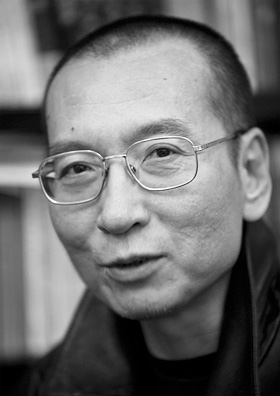 Liu Xiaobo, a prominent independent intellectual in China, is a long-time advocate of political reform and human rights in China and an outspoken critic of the Chinese communist regime called to end the communist one-party rule in China. Liu Xiaobo has been detained, put under house arrest and imprisoned many times for his writing and activism.
Liu Xiaobo, a prominent independent intellectual in China, is a long-time advocate of political reform and human rights in China and an outspoken critic of the Chinese communist regime called to end the communist one-party rule in China. Liu Xiaobo has been detained, put under house arrest and imprisoned many times for his writing and activism.Liu Xiaobo was born on 28 December 1955 in Changchun, Jilin. He received a BA in literature from Jilin University, and an MA and PhD from Beijing Normal University, where he also taught.
In April 1989, he left his position as a visiting scholar at Columbia University to return to Beijing to participate in the 1989 Democracy Movement. On June 2, Liu Xiaobo, along with Hou Dejian, Zhou Duo, and Gao Xin, went on a hunger strike in Tiananmen Square to protest martial law and appeal for peaceful negotiations between the students and the government. In the early morning of June 4, 1989, the four convinced the students to leave Tiananmen Square when the authorities began to crack down with brutal and fatal force and saved many lives. After the crackdown, Liu was held in Beijing’s Qincheng Prison until January 1991, for “counter-revolutionary propaganda and incitement”.
Liu Xiaobo served from 2003 to 2007 as President of the Independent Chinese PEN Center, an organization affiliated with International PEN. Before he was detained, he was President and Editor-in-Chief of Minzhu Zhongguo (Democratic China) Electronic Journal, which promotes liberty, democracy, human rights, rule of law and constitutionalism. On 8 December 2008, Liu Xiaobo was detained because of his leading role with the Charter 08 manifesto. He was formally arrested on June 23, 2009 on “inciting subversion of state power”. He was tried on the same charges on December 23, 2009, and sentenced to eleven years’ imprisonment and two years’ deprivation of political rights on December 25, 2009.
During his fourth prison term, he was awarded the 2010 Nobel Peace Prize for “his long and non-violent struggle for fundamental human rights in China.” He is the first Chinese citizen to be awarded a Nobel Prize of any kind while residing in China. He is the fourth person to be awarded the Nobel Peace Prize while in prison or detention, after Nazi Germany’s Carl von Ossietzky (1935), the Soviet Union’s Andrei Sakharov (1975), and Myanmar’s Aung San Suu Kyi (1991). Liu is also the first person since Von Ossietzky to be denied the right to have a representative collect the Nobel Prize for him.












